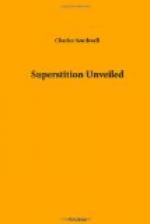Books have been written to exhibit the difficulties of (what priests choose to call) Infidelity, and without doubt unbelief has its difficulties. But, according to a universally recognised rule of philosophising, of two difficulties we are in all cases to choose the least. From a rule so palpably just no one can reasonably depart, and the Universalist, while freely admitting a great difficulty on his own side, is satisfied there can be demonstrated an infinitely greater difficulty on the side of his opponents. The Universalist labours to convince mankind they are not warranted by the general course of Nature in assigning to it a Cause; inasmuch as it is more in accordance with experience to suppose Nature the uncaused cause, than to imagine, as errorists do, that there is an uncaused cause of Nature.
Theologians ask, who created Nature? without adducing satisfactory evidence that Nature was created, and without reflecting that if it is difficult to believe Nature self-existent, it is much more difficult to believe some self-existent Super-nature, capable of producing it. In their anxiety to get rid of a natural difficulty, they invent a supernatural one, and accuse Universalists of ‘wilful blindness,’ and ‘obstinate deafness,’ for not choosing so unphilosophic a mode of explaining universal mystery.
The rule of philosophising just adverted to—that rule which forbids us, in any case, to chose the greater of two difficulties—is of immense importance, and should be carefully considered by every one anxious to arrive at correct conclusions with respect to theology. For if believers in God do depart from that rule—if their belief necessarily involve its violation—to persist in such belief is to persist in what is clearly opposed to pure reason. Now, it has been demonstrated, so far as words can demonstrate any truth whatever, that the difficulty of him who believes Nature never had an author, is infinitely less than the difficulty of him who believes it had a cause itself uncaused.
In the ‘Elements of Materialism,’ an unequal, but still admirable work by Dr. Knowlton, a well-known American writer, this question of comparative difficulty is well handled.
‘The sentiment,’ says the Doctor, ’that a being exists which never commenced existence, or what is the same thing, that a being exists which has existed from all eternity, appears to us to favour Atheism, for if one Being exist which never commenced existence—why not another—why not the universe? It weighs nothing, says the Atheist, in the eye of reason, to say the universe appears to man as though it were organised by an Almighty Designer, for the maker of a thing must be superior to the thing made; and if there be a maker of the universe there can be no doubt, but that if such maker were minutely examined by man, man would discover such indications of wisdom and design that it would be more difficult for him to admit that such maker was




